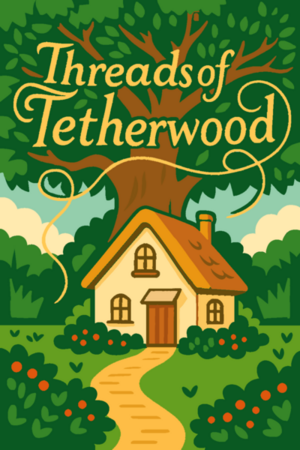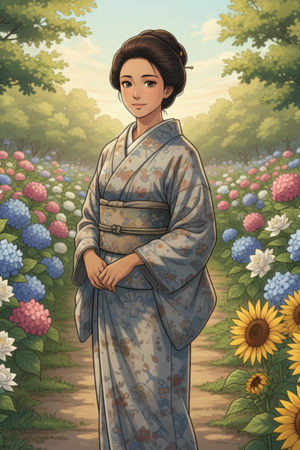Chapter 10:
Chapter 10: The Patch That Speaks
Threads of Tetherwood
Lina had almost stopped noticing the cloak’s pull.
Once, those soft tugs had startled her—like invisible fingertips brushing her shoulder, urging her to turn, to listen, to be. In the beginning, she’d fought it, suspicious of its will. But over the years, it had woven itself into the rhythm of her days, quiet and constant as her own pulse.
It was her compass now.
When she lingered too long in sadness, it nudged her toward laughter.When a neighbor’s grief went unspoken, it drew her near.When a spell soured in the air, it hissed faintly, warning her.
She obeyed it the way one obeys breath—without thinking. The cloak knew better.
Sometimes she’d even speak to it in the quiet.“Is it really you guiding me,” she would murmur, “or just what I want to hear?”The cloak never replied in words, only in the faint tug of thread against thread—an answer that somehow felt like patience.
But that morning, it did not tug.
It throbbed.
A deep, resonant pulse—like the fabric had found its own heart. It reverberated through her shoulders, down her spine, into the marrow of her bones. It wasn’t guidance this time. It was warning.
She froze by the hearth, spoon in hand. The air around her felt taut, stitched too tightly. The scent of steeping herbs turned sharp, metallic.
Her heart began to hammer in answer to the cloak’s strange rhythm.
“Not now,” she whispered to the empty cottage. “Please, not now.”
She waited—half hoping, half dreading. The cloak hung motionless on its stand, a dark shape in the soft firelight. Its hem still glistened faintly from last night’s rain.
Nothing moved.
“You’re scaring me,” she muttered, forcing a laugh that broke too quickly. “You’ve never done that before.”
Still nothing.
Then, a slow, deliberate pulse.
Once.Twice.
And for the first time in years, Lina felt something colder than doubt slip beneath her ribs. She set the spoon down carefully, afraid even the sound of metal on wood might shatter the moment.
Her eyes drifted toward the cloak. “If this is another of your lessons,” she said softly, “I’m not sure I’m ready for it.”
She tried to return to her tea—her hands steady only because she willed them to be. But when she lifted the kettle, the air rippled faintly, as though the room itself exhaled.
Then it happened.
The cloak flared.
Every patch burst into light—amber, blue, silver, gold. The air shimmered like heat over stone. Threads lifted from the fabric, twisting gently, alive in the stillness.
Lina’s breath hitched. “Cloak?”
The word came out smaller than she intended.
Her teacup trembled between her fingers. She felt it before she heard it—A sound that wasn’t a sound, blooming deep inside her bones.
“Lina.”
The cup slipped from her hands, shattering against the hearthstone.
“Lina, my stitch-child.”
Her pulse stuttered. That voice—warm, soft, worn smooth by the memory of stories told by candlelight. She hadn’t heard it since—
“Granny?” she whispered.
For a heartbeat, the world seemed to hold its breath.
“ Follow the thread. It’s time.”
The glow dimmed—but the cloak’s heartbeat quickened, thrumming against the quiet.
Lina stepped closer, trembling. The fabric that had always felt like a friend—her silent guardian, her secret companion—suddenly seemed immense. Ancient. Alive.
“Time for what?” she breathed. “Where are you?”
The cloak didn’t answer. Its patches pulsed again—gentle, insistent. The one sewn with the blue thread—the book and thread symbol—burned brighter than the rest, its glow like captured dawnlight.
She reached out a shaking hand. “If you want me to follow, then show me,” she whispered. “But please… don’t leave me guessing.”
The cloak’s light flickered, then steadied—as if in acknowledgment.
And Lina, heart thundering, knew with sudden clarity and terror that something was calling her—something she could no longer ignore.
She turned toward the door.
The air outside shimmered faintly.
The world was waiting.
She didn’t pack. She didn’t plan.She simply went.
The cloak tightened around her shoulders, its folds breathing with purpose. Each pulse against her back was a heartbeat not her own—steady, insistent, alive. The path ahead seemed to open in rhythm with it: the world itself yielding to her steps.
She crossed the cottage threshold, and the air changed. The wind hummed low through the spool-trees, their bark glinting faintly like threads of copper under the pale dawn. Dew pooled in the hollows of her boots, cool and grounding. She followed the tug.
“Granny,” she murmured, voice barely a thread in the waking stillness, “where are you leading me?”
The cloak responded with a faint ripple, like laughter held in cloth.
She moved faster, heart thrumming in tune with it. Past the weeping hedge where silver sap glistened like tears, through the thistle field that shimmered with dawnlight. The world felt alive in ways it never had before—each blade of grass, each petal, whispering in some language older than words.
And then—silence.
The thistles parted before her.
There, between two enormous trees whose roots intertwined like clasped hands, stood a door.
No walls. No hinges. Just a freestanding frame of pale wood, veined with delicate copper lines that pulsed faintly—like veins under skin.
At its center was a patch sewn directly into the wood:
📖 — the book and thread.
Lina hesitated. “I’ve seen you before,” she whispered. “You’re the same mark that burns when I dream.”
The cloak stirred at her shoulders, threads whispering against each other like rustling leaves.
“Is this what you wanted to show me?”
It pulsed once—yes.
She stepped forward and touched the patch.
The wood felt warm beneath her fingertips—alive. The copper lines shimmered, chasing each other in dizzying spirals. The fabric of her cloak shuddered in response, threads sparking blue and gold.
Then, a sound—a quiet, aching click.
The door swung open.
And the world fell away.
Light swallowed her. When it faded, she was standing in a room that smelled of lavender and candle wax.
A workshop.
She knew it instantly, though she’d never set foot there before. The air was thick with memory—gentle, golden, humming softly like a lullaby she almost remembered.
Spools of thread filled the walls, sorted not by color but by feeling: Joy, Regret, Wonder, Forgiveness. Some gleamed faintly; others lay dull, heavy with time.
A loom sat in the center of the room, half-finished cloth draped across it, glowing faintly under the lamplight. Tools hung neatly in rows. And near the corner stood a cloak stand carved with spiraling leaves.
Her breath trembled. “Granny?”
Then she saw her.
Granny Harrow—young again. Barefoot. Radiant. Her hair a cascade of auburn waves, her eyes sharp and alive. Not the gentle old woman who’d smelled of tea and mint, but a woman lit from within by purpose.
Lina pressed a hand to her mouth. “I remember this room… but only from your stories.”
And then she saw her.
The figure behind the loom—tall, poised, haloed in threads of silver that moved like moonlight in water. Her outline wavered, almost human, almost more.
“Eliwyn,” Lina whispered. “The last tailor.”
Her voice came out as a tremor of disbelief.
“Not dreaming,” said a voice—Granny’s, yet not from her lips. It came from everywhere, soft and resonant, like the whisper of cloth brushing cloth.“Remembering.”
The young Harrow laughed—an unguarded, full sound that filled the room.
“Pull the thread tighter, Eliwyn! You’ll unravel it if you—oh, there, see? What did I tell you?”
Eliwyn chuckled, her voice like the quiet rustle of silk.
“You always were too fond of rules, Harrow. A stitch breathes best when it’s not afraid to bend.”
Harrow crossed her arms, pretending to scowl. “If I left the world to your kind of weaving, we’d all be wrapped in chaos and sentiment.”
“And yet,” Eliwyn said, tugging the thread with impossible precision, “chaos and sentiment are where beauty hides.”
Lina’s eyes stung. The way they spoke—so familiar, so alive—it ached to witness. “You were friends,” she whispered. “You worked together.”
“We did,” came the voice again—Granny’s, older now, from the cloak itself.“She taught me to weave kindness into cloth. To stitch truth even when it hurt.”“When she vanished, I carried her last cloak into the waking world. To keep it safe.”“Until you.”
Lina’s hands curled into fists, knuckles whitening. “You left it for me.”
“No, stitchling,” the voice murmured, gentle and sad.“I left it for whoever listened. You just happened to be the one who did.”
The workshop’s light flickered, edges bleeding into golden dust. Shelves blurred. Spools dimmed. The scent of lavender began to fade.
“Wait,” Lina said, desperate now. “Don’t go yet. Please—tell me what the Stitchway is. Tell me why me.”
The younger Harrow turned, her gaze cutting through the fading world, her voice layered with age and love.
“Don’t be afraid of the unraveling, Lina.”“Sometimes a thread must break before it finds where it belongs.”
Lina’s voice cracked. “You always said that when I made mistakes sewing. You meant—”
“I meant everything,” said Granny’s voice, warm and fierce now, echoing through the room. “Every tear, every wrong stitch, every choice. They all matter. The cloth remembers.”
The light intensified—too bright, too beautiful to look at.
“You’ve sewn care into every corner. Love into every loose end. You are ready for the Stitchway.”
Lina reached for her grandmother’s hand—but it dissolved into light.
The room shattered into threads of gold and white.
And suddenly, she was standing again among the trees, dawn breaking pale and fragile around her. The door stood silent behind her, its copper veins gone cold.
The cloak was still pulsing—softly, like a tired heart.
Lina pressed her palm over it, breath trembling. “I remember now,” she whispered. “You carried her voice… and now you carry mine.”
The wind stirred the branches overhead—a sigh, a promise.
And somewhere deep in the fabric, she felt it: a faint hum of approval.
The wind had stilled.The world felt different—stitched tighter somehow, the seams of reality humming faintly against her skin, as though the forest itself had been rethreaded.
When Lina returned to the cottage, the air inside was quiet—too quiet. The hearth had gone out, but the smell of lavender and old candlewax lingered, soft and haunting. She set the cloak on the table. It unfurled obediently, like a creature exhaling after a long journey.
“Alright,” she murmured, brushing dust from her hands. “Let’s see what you’ve been hiding.”
The fabric shimmered faintly under the lamplight as she traced the patches one by one:
🌧️ — for the sky’s sorrow.📖 — for the truth in memory.🎵 — for the music of mistake.🪡 — for the softness in brokenness.
Each one pulsed beneath her fingers, alive with memory. As she touched the final patch, the cloak seemed to sigh—threads shifting minutely, as though something within were stirring.
Then her fingertips brushed against a seam she didn’t recognize.
A thread—new, luminous—woven beneath the lining. She peeled the edge back gently, breath held.
There it was.A patch still forming, its embroidery faintly aglow.A needle crossed with a star.
Her throat tightened. “A new beginning…” she whispered, voice trembling. “Or… a promise?”
The cloak gave a soft rustle—almost like agreement.
She sat down heavily, staring at the patchwork as if seeing it anew. “You’re not just a relic,” she said quietly. “You’re alive. You remember her. And now… you remember me.”
A faint whisper, like silk brushing against wood.“And you remember yourself, stitchling.”
Lina froze. “Granny?”
The voice was softer this time, half memory, half magic.
“Every seam you mend, every truth you speak aloud, adds your thread to the Loom. Do you understand now?”
“I think so,” Lina said. “The cloak doesn’t just protect—it records. It carries what we choose to love.”
“And what you choose to let go,” the whisper added gently. “That’s part of the weaving too.”
Lina’s eyes burned. “Then… if I keep sewing, if I keep listening—”
“You’ll find your way to the Stitchway,” the voice said. “Just as we did. Just as all tailors must.”
Silence followed, but it was a kind one—the kind that waited, not the kind that ended.
She reached for her needle and thread.
That night, by the soft glow of a single candle, she stitched a single line of golden thread inside her desk drawer—where she kept her letters. The thread pulsed faintly, alive with quiet magic.
Then she took a fresh sheet of paper, her fingers trembling slightly as she dipped the quill.
Dear Granny,
I saw you today.Not the woman who told me bedtime stories,but the dreamer who wove them first.
I think I understand now.The cloak doesn’t just protect—it remembers.And maybe, if I keep listening, it will show me how to mendwhat was left undone.
I’m going where you once went.If I find Eliwyn, I’ll bring her words home.
Love,Lina
When she folded the letter, the parchment gave a faint shimmer—as if the ink itself had accepted the promise. She slid it beneath the stitched thread and closed the drawer.
The room exhaled.The candle flickered, but did not die.Outside, the wind shifted—soft, approving. The branches of the spool-trees brushed gently against the window, their movements forming the faintest pattern of light.
She touched the cloak one last time. “No more waiting,” she whispered. “No more following. We walk together now, you and I.”
The cloak rose—light as breath—and settled itself around her shoulders. It didn’t tighten this time, didn’t lead.
It pulsed once—steady, sure—and then fell still.
For the first time since it had chosen her, Lina felt not guided.
Not led.
But equal.
Outside, the night opened before her like a blank sheet of cloth, waiting to be sewn with whatever thread she dared choose.
And as she stepped into the dark, the stars above flickered—like tiny needles, stitching a new path across the sky.
End of Chapter 10: The Patch That Speaks




Please sign in to leave a comment.